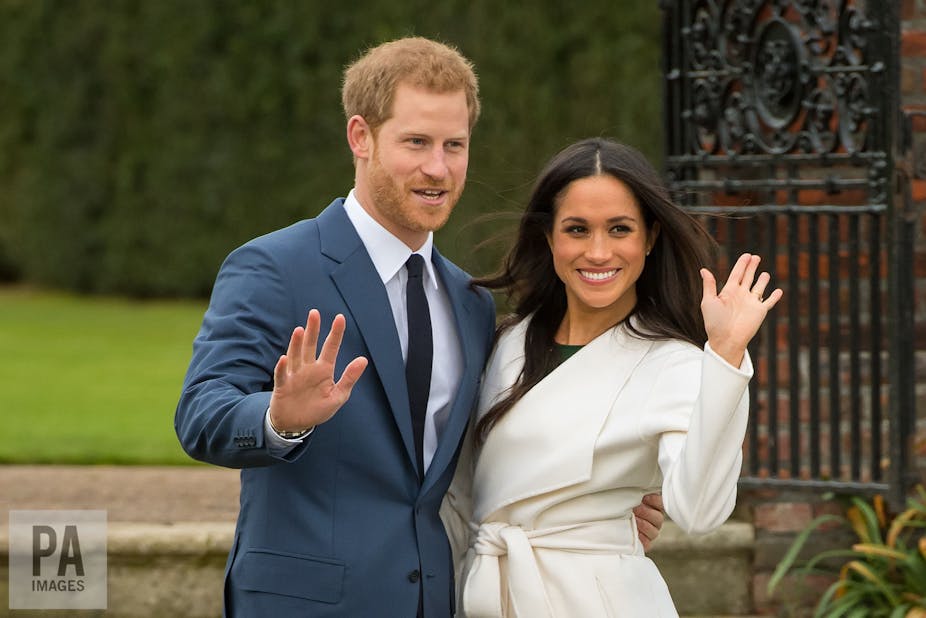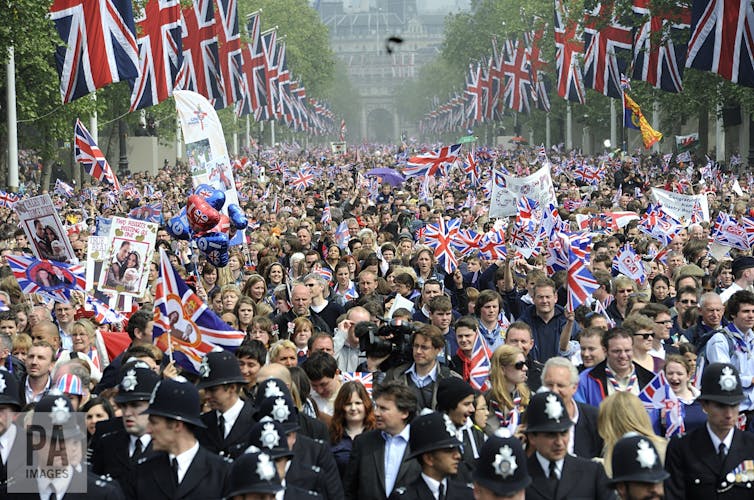Fact Check: do tourists visit Britain because of the royal family?
Reader in Tourism and Management, Cardiff Metropolitan University
Senior Teaching Fellow (Tourism), University of Portsmouth

Disclosure statement
The authors do not work for, consult, own shares in or receive funding from any company or organisation that would benefit from this article, and have disclosed no relevant affiliations beyond their academic appointment.
Cardiff Metropolitan University provides funding as a member of The Conversation UK.
View all partners

The royals draw millions of tourists every year.
The Daily Mail , November 20, 2017.
The Royal family are so important for tourism in London.
A spokesperson for VisitBritain, quoted in the International Business Times , November 27, 2017.
Regardless of whether you are a royalist or not, the royal family undeniably attracts public interest around the UK and internationally. Visits and tours by the royals generate extensive media attention – as well as tourists.
Love it or hate it, the pomp and pageantry associated with British royalty, whether routine events such as trooping the colour or anniversaries such as the Queen’s Diamond Jubilee in 2012, are rarely found in any other country. These public ceremonies, in addition to parts of the estates owned by the royal family, are important in attracting tourists.
When Prince William married Kate Middleton in April 2011, the UK’s Association of Leading Visitor Attractions claimed it:
Saw an additional 600,000 people come to London for the weekend, 60% from UK, 40% from overseas, spending £107m … The value to ‘brand Britain’ due to global media coverage was approximately £1 billion.
VisitBritain reported that, globally, more than two billion people watched the wedding ceremony, with its content aired by key broadcasters internationally. It wasn’t just visitors to London that increased – the Office for National Statistics reported that during April 2011, an extra 350,000 visitors travelled to the UK compared to 2010. Tourism also flourished on the island of Anglesey in Wales, where the royal couple lived after the wedding. Tourism managers said William and Kate brought priceless publicity and some tourism businesses reported a 20% increase in business in 2011.

The queen’s official residences also attract significant numbers of visitors : 2.8m people in 2016, with the top three being Windsor Castle (1,432,260 visitors), Buckingham Palace (576,995 visitors), and the Palace of Holyroodhouse (392,260 visitors). These statistics corroborate research by VisitBritain in 2011 which showed that more than 60% of overseas visitors who come to Britain are “likely” to visit places associated with the royal family.
Britain is recognised as a world-class destination for culture and heritage. Although VisitBritain does not collate statistics on the royal family as an attraction, in a 2012 response to a freedom of information request under its former name as the British Tourist Authority, it estimated that those visitors to the UK who are attracted by British culture and heritage spend in the region of £4.5 billion annually, out of a total overseas visitor spend of £17 billion. Approximately £500m of that £4.5 billion is attributed to attractions and events connected to the royal family, past and present.
There is an absence of data as to whether tourists go to the UK specifically because of the royal family. However, while tourists might not be primarily attracted to the UK solely by the monarchy, the spectacle of royal events and access to parts of the royal estate across the UK enables VisitBritain and other national tourism agencies to build on Britain’s tourism appeal which blends heritage, pageantry and the contemporary. In this way, the relationship between royalty and tourism has an important economic and destination marketing dimension.
Liz Sharples, senior teaching fellow (tourism), University of Portsmouth
It is not difficult to agree with the verdict of this fact check, although, as it points out, data specifically identifying “royalty and monarchy” as the main motivator for travel is hard to pinpoint.
VisitBritain states that 64% of visitors going to Britain plan to visit famous monuments and buildings with over a third of tourists visiting London listing a tour of Buckingham Palace as a bucket list activity.
In contrast, Republic, an anti-monarchy pressure group, challenges the view that the British monarchy is good for tourism and argues that other attractions pull in more visitors. In 2016, for example, the British Museum was the UK’s most visited attraction, and according to data from the Association of Leading Visitor Attractions, more people visited Chester Zoo and Kew Gardens than Windsor Castle .
However, with the current slump in the pound and the spring wedding of Prince Harry to American Meghan Markle, it is almost impossible not to agree that tourists (particularly those from the US) will be drawn – by royal invitation – to Britain in 2018.
- Royal Family
- Fact Check UK
- British monarchy

Biocloud Project Manager - Australian Biocommons

Director, Defence and Security

Opportunities with the new CIEHF

School of Social Sciences – Public Policy and International Relations opportunities

Deputy Editor - Technology
Stay up to date with notifications from The Independent
Notifications can be managed in browser preferences.
UK Edition Change
- UK Politics
- News Videos
- Paris 2024 Olympics
- Rugby Union
- Sport Videos
- John Rentoul
- Mary Dejevsky
- Andrew Grice
- Sean O’Grady
- Photography
- Theatre & Dance
- Culture Videos
- Food & Drink
- Health & Families
- Royal Family
- Electric Vehicles
- Lifestyle Videos
- UK Hotel Reviews
- News & Advice
- Simon Calder
- Australia & New Zealand
- South America
- C. America & Caribbean
- Middle East
- Politics Explained
- News Analysis
- Today’s Edition
- Home & Garden
- Fashion & Beauty
- Travel & Outdoors
- Sports & Fitness
- Sustainable Living
- Climate Videos
- Behind The Headlines
- On The Ground
- Decomplicated
- You Ask The Questions
- Binge Watch
- Travel Smart
- Watch on your TV
- Crosswords & Puzzles
- Most Commented
- Newsletters
- Ask Me Anything
- Virtual Events
- Betting Sites
- Online Casinos
- Wine Offers
Thank you for registering
Please refresh the page or navigate to another page on the site to be automatically logged in Please refresh your browser to be logged in
How much money does the royal family bring in tourism?
Each year, millions of tourists travel to the uk to visit its many historical royal landmarks, article bookmarked.
Find your bookmarks in your Independent Premium section, under my profile

Stay ahead of the trend in fashion and beyond with our free weekly Lifestyle Edit newsletter
Thanks for signing up to the lifestyle edit email.
The British royal family ’s reign spans 37 generations and 1209 years.
Buckingham Palace in London has served as the official residence of the UK’s sovereigns since 1837 and today is the administrative headquarters of the ruling monarch.
And each year, the royal family is responsible for generating millions of pounds worth of tourism for the United Kingdom.
In the fiscal year 2019-20, the royal estate’s income from ticket admissions in the UK rose over the previous year, according to Statista.
Overall, the admission income peaked at nearly £49.9m in 2019-20, increasing from approximately £48.4m in 2018-19.
Here’s everything you need to know about the UK’s royal tourism industry.
How much tourism money does the royal family bring into the UK?
According to Forbes , the House of Windsor is estimated to be worth £19bn.
It helps earn hundreds of millions for Britain’s economy every year, with Windsor Castle and Frogmore House recording roughly 426,000 paying visitors between April 2021 and March 2022. An adult ticket costs £26.50 from Sunday to Friday.
Other royal tourist destinations such as Buckingham Palace, the Royal Mews, Clarence House, the Palace of Holyroodhouse, and the Queen’s Gallery also generate significant revenue.
As well as generating income from ticket sales, the various landmarks also sell souvenirs, trinkets, hampers and publishing, as well as a Christmas hamper.
What are some other ways the royal family makes money?
The royal family also generates tourism revenue via the royal collection and the crown’s estate.
The royal collection is known to be the most significant in the world. According to its annual report of 2019-20, a record 3,285,000 people visited the official residences, generating approximately £49,859,000.
From a retail perspective, gift shop sales of the royal collection made £19,983,646 in a single year, making its total income of the year to be £71,526,000.
The Crown estate includes various properties based in the UK. It includes Regent Street in London, Windsor Great Park and Ascot Racecourse.
The Crown estate also controls around 1,960,000 acres of agricultural land and forest, and more than half of Britain’s foreshore.
Overall, how much does the royal family contribute to the UK economy?
While the average annual cost for UK taxpayers in royal upkeep comes to around £500m a year, Brand Finance estimates the monarchy ’s brand contributes £2.5bn to the British economy in the same timeframe.
Follow the latest updates following the death of Queen Elizabeth II here
Join our commenting forum
Join thought-provoking conversations, follow other Independent readers and see their replies
Subscribe to Independent Premium to bookmark this article
Want to bookmark your favourite articles and stories to read or reference later? Start your Independent Premium subscription today.
New to The Independent?
Or if you would prefer:
Want an ad-free experience?
Hi {{indy.fullName}}
- My Independent Premium
- Account details
- Help centre
Microsoft has discontinued support for Internet Explorer , which means it doesn't use modern web technologies, and some pages won't display correctly. We recommend using Google Chrome for the best viewing experience.
- Go to our page
- Share on Facebook
- Share on LinkedIn
- --> Share on Flickr -->